We may not have the course you’re looking for. If you enquire or give us a call on +27 800 780004 and speak to our training experts, we may still be able to help with your training requirements.
Training Outcomes Within Your Budget!
We ensure quality, budget-alignment, and timely delivery by our expert instructors.
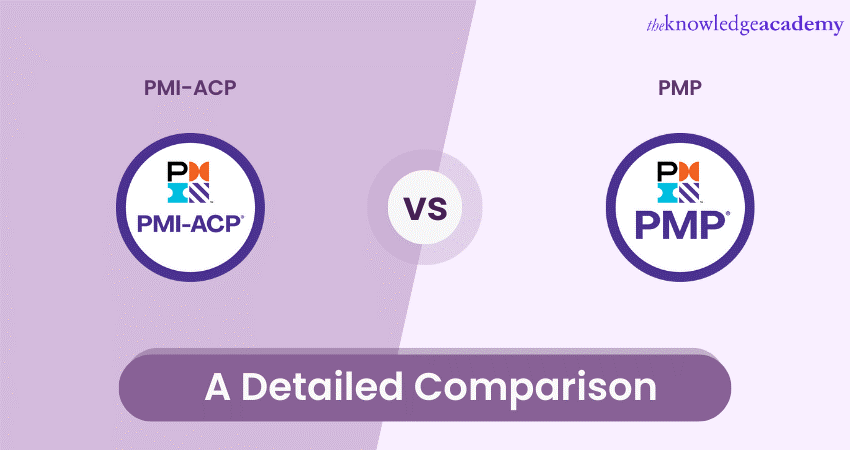
The Project Management Institute's (PMIs) Agile Certified Practioner (ACP) and Project Management Professional (PMP) are two of the most renowned qualifications in Project Management. Having either one of these qualifications will accelerate your career growth but choosing one between these two can be a dilemma. A detailed comparison of PMI ACP vs PMP can help improve your decision-making process.
According to PMI Salary Survey 12th Edition, professionals with a Project Management Certification like PMP earn 16 per cent higher average salaries compared to others. In this blog, you will learn PMI-ACP vs PMP with a detailed comparison. Moreover, you will also learn about the career opportunities for obtaining these certifications.
Table of Contents
1) An overview of PMI-ACP and PMP
2) What is the Exam Format of PMI-ACP and PMP?
3) Career Opportunities
4) What are the pros and cons of obtaining these certifications?
5) Which certification to choose?
6) Conclusion
An overview of PMI ACP and PMP
Project management certification is crucial for career progression in today's demanding work environment. The PMI-ACP focuses on Agile techniques, while the PMP is a widely recognised qualification.
What is PMI-ACP?
PMI-ACP or PMI Agile Certified Practitioner is a certification that demonstrates your skills, knowledge and experience as part of the agile team. It provides Agile Certified Practitioners with multiple approaches rather than limiting them to a single approach.
Requirements and cost of PMI-ACP
Although no specific educational requirement exists, it is better to have at least higher secondary schooling or equivalent academic qualification. You should have about 2000 hours of experience in managing project management teams. Although, this is not necessary if you already hold a PMP or Program Management Professional (PgMP) certification.
Apart from this, you should possess at least 1500 hours of work experience with Agile teams and methodologies. Moreover, you should also have at least 21 hours of prior training in Agile practices from a recognised training partner.
PMI-ACP certification renewal and cost
Once you acquire this certification, it will be valid for three years. So, certification renewal is necessary if you want to maintain this certification. As per PMI, the renewal cost for PMI members is about 48 GBP, while for non-members, it is 120 GBP.
Certified professionals must acquire 30 Professional Development Units (PDUs) during a three-year cycle, emphasising agile project management practices to maintain their certification.
What is PMP?
PMP is a Project Management Certification offered by the PMI. It is one of the most recognised and highly sought certifications. It helps showcase that you have the experience and knowledge of project management.
Requirements and cost of PMP
If you completed higher secondary schooling, then you must have worked in Project Management for five years or more to become PMP certified. That roughly equates to 7500 hours of directing and managing projects, and at least 35 hours of project management training is necessary.
If you have a bachelor's degree (four years or more) with at least three years of experience in project management. That equates to 4500 hours of directing and managing projects, and at least 35 hours of project management training is required.
PMP certification renewal and cost
Once the certification's validity expires, you can opt to renew it as it has many benefits. For instance, Renewing PMP Certification showcases that you possess relevant knowledge of project management and are up to date with the latest changes.
The renewal cost for PMI members is about 48 GBP, while for non-members, it is 120 GBP. The validity of the PMP certification is about three years, and the only way to renew it is by earning 60 PDUs within three years.

What is the Exam Format of PMI-ACP and PMP?
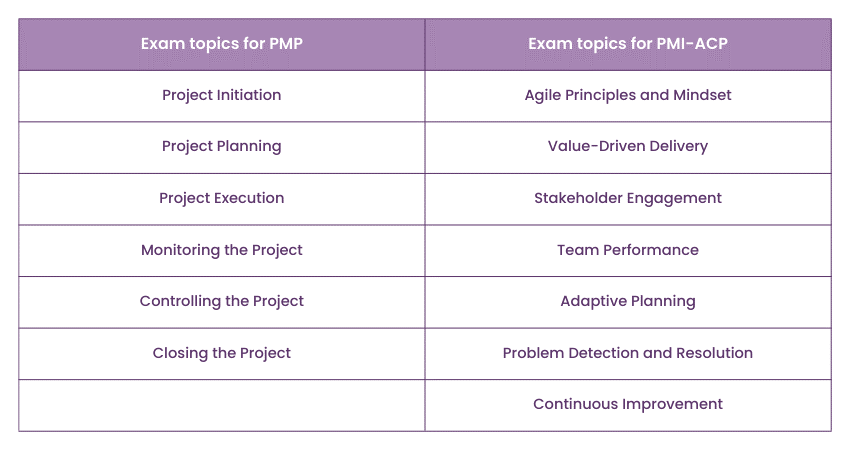
PMI-ACP and PMP both deal with Project Management; however, the exam pattern for these exams varies drastically for obvious reasons. The exam pattern for both is discussed below.
Exam Pattern
The PMP exam consists of 200 multiple-choice questions, and candidates are given four hours to finish the exam. Other than that, it has 25 pre-test questions, and their marks will not be considered for the final score. The PMI ACP exam has 120 multiple-choice questions and is computer-based. It has a 180-minute time limit.
Key Exam topics for PMI-ACP
This exam is based on Agile methodologies and practices. It also covers Agile frameworks and methodologies such as Scrum, Kanban, Lean, and XP. Apart from this, it also deals with the seven agile project management domains and which are listed below:
a) Agile values and outlook
b) Value-driven execution
c) Performance of the team
d) Stakeholder involvement
e) Detect and resolving of issues
f) Continuous development
g) Adaptive planning
Key Exam Topics for PMP
This exam is based on the PMBOK Guide, a reference resource for project management produced by the Project Management Institute (PMI). It covers the following ten knowledge domains like Stakeholder, Integration, Scope, Time, Cost, Quality, Resource, Communication, Risk and Procurement. Additionally, it covers the five project management processes, and they are listed below:
a) Project Initiation
b) Project Planning
c) Project Execution
d) Monitoring and Controlling the Project
e) Closing the Project
The choice between taking the PMP exam or the PMI ACP exam depends on an individual's career goals, industry focus, and interests. Those who work in traditional project management environments may benefit from taking the PMP exam, while those who work in Agile environments may benefit from taking the PMI ACP exam.
Study Materials
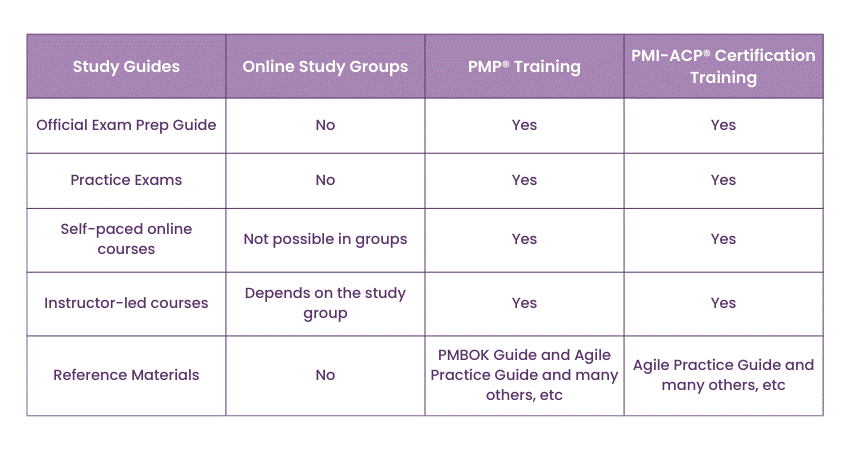
Study materials help better prepare for the exam. Here are some of the best study materials to help in your preparation:
Study Materials for PMI-ACP:
a) Agile Estimating and Planning by Mike Cohn
b) Agile Practice Guide by Project Management Institute
c) Agile Project Management: Creating Innovative Products by Jim Highsmith
Study Material for PMP:
Harold Kerzner's "Project Management: A Systems Approach to Planning, Scheduling, and Controlling" and Effective Project Management: Traditional, Agile, Extreme, Hybrid by Robert K. Wysocki are some of the most useful resources.
Study Time:
To get certified, you must clear the exam, whether it's PMI-ACP or PMP. It is entirely up to the individual regarding the time taken to prepare for the exam. Some people start their preparation very late and, as a result, would have very less time for preparation. This would decrease their chances of cracking the exam. So, starting early ensures you have adequate time for preparation and increase your chances of cracking the exam.
Signup for PMP® Certification Training Course and learn everything about Project Management!
Career Opportunities
The PMP is based on a conventional project Management approach, while PMI-ACP is based on Agile methodologies. So, both these qualifications open the doorway for various job roles in multiple industries. Above all, they monumentally increase your earning potential and career prospects.
PMP Career Opportunities
Having a project management certification increases your career prospects and helps expand your professional network. Moreover, the demand for project management professionals remains consistently high.
a) Job opportunities: Acquiring a PMP Certification can increase your career prospects and enhance your job profile, as the credential is well-recognised globally. It opens up the door for many roles like Project Manager, Portfolio Manager, Program Manager, Business Analyst and many roles etc.
b) Sectors: Many industries like finance, construction, IT, healthcare and engineering prefer PMP Certification as it is relevant.
Salary for PMP-certified professional
Having a PMP certification can certainly increase your pay as well. Professionals with PMP Certifications often received higher median salaries than those without any certifications.
a) Job opportunities: The PMI-ACP Certification can surely pave the career path towards job roles like Agile Project Manager, Agile Coach, Product Owner and Scrum Master.
b) Sectors: Many industries like Software development, product development, marketing and IT prefer candidates with PMI-ACP Certification as it is more relevant to their business.
Salary for PMI-ACP certified professional
This certification has significant potential to increase your wages and benefits. A PMI-ACP Certified professional in the UK earns about 50,000 GBP per year. While in the US, the median salary is 116,000 USD, and in India, it is about two million INR annually.
Roles and Responsibilities of PMP Certified Professionals
When you complete PMP certification, you are more likely to oversee projects and less likely to communicate with the entire team. You are more likely to communicate with people in leadership roles. You are not responsible for producing results but would be in a position to oversee the results.
Roles and Responsibilities PMI-ACP
As a professional who completes this qualification, you are likely to lead and communicate with team members frequently. You are also in charge of producing results and will search for ways to increase productivity.
Gain in-depth knowledge on Project Management and Enhance your Agile skills with PMI-ACP® Certification Training!
What are the pros and cons of obtaining these certifications?
Before choosing between these two, it is best to know the advantages and disadvantages of these two. This not only gives clarity but also ensures that you pick the one that suit your needs.
Advantages of PMP:
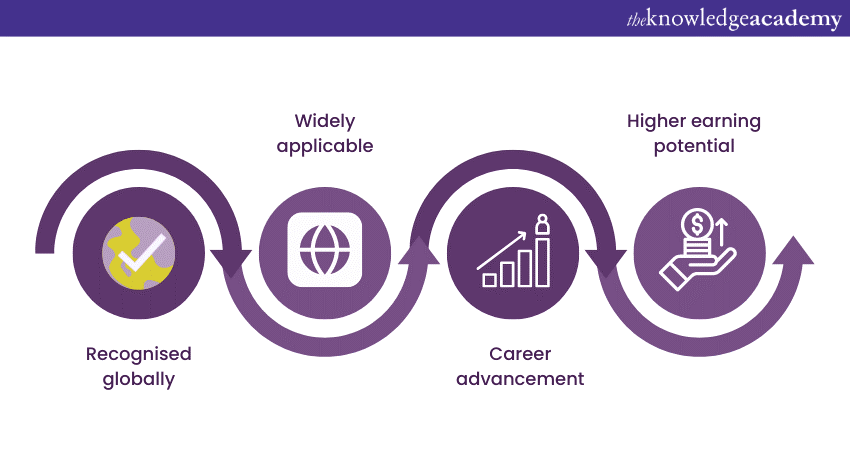
PMP-certified professionals have more earning potential when compared to those without any qualifications. Apart from this, there are many Benefits of PMP certifications, some of which are listed below:
a) Recognised globally: PMP (Project Management Professional) is a globally recognized certification and is highly valued by organizations across industries.
b) Widely applicable: The PMP certification covers a broad range of project management areas and is applicable to various industries, including construction, IT, healthcare, and finance.
c) Career advancement: PMP certification can help professionals advance in their careers, providing them with the skills and knowledge needed to manage complex projects and teams.
d) Higher earning potential: PMP-certified professionals tend to earn higher salaries compared to their non-certified counterparts.
Disadvantages of PMP:
The PMP certification exam is rigorous, requiring significant time and effort to prepare for and pass. Some of its disadvantages are listed below:
a) Expensive: The PMP certification exam and related training courses can be expensive, making it difficult for some professionals to obtain.
b) Renewal: To maintain PMP certification, you need to renew it every three years, which can be an expensive process.
Benefits of PMI-ACP
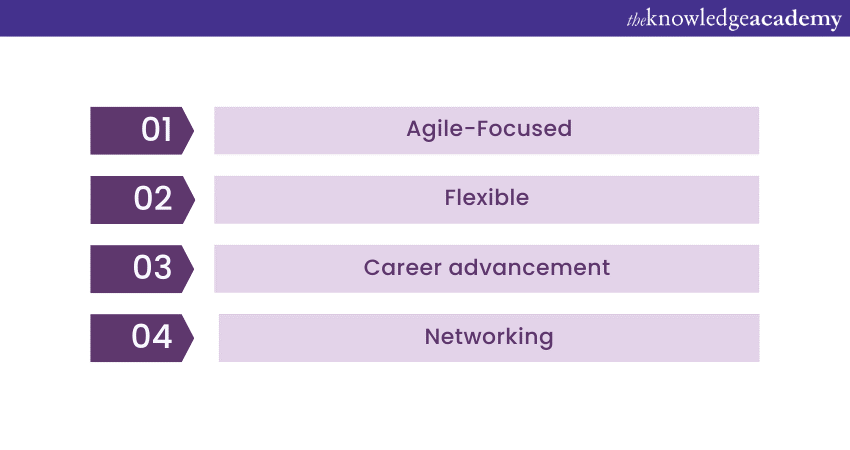
The following are the benefits of PMI-ACP:
a) Agile-Focused: The Project Management Institute Agile Certified Practitioner (PMI-ACP) certification programme is centred on Agile practises, which are becoming more and more common in project management.
b) Flexible: The PMI-ACP certification is flexible since it recognises a variety of Agile techniques, such as Scrum, Kanban, and Lean.
c) Career advancement: By equipping individuals with in-demand knowledge and abilities, PMI-ACP certification can help them grow in their professions.
d) Networking: People with PMI-ACP certifications can connect with other Agile professionals, which could result in job prospects.
Disadvantages of PMI-ACP
The PMI-ACP certification is only focused on Agile approaches, so it might not be as useful in sectors that don't employ Agile. The following are the cons of PMI-ACP:
a) Level of expertise: Some professionals may find the PMI-ACP certification's requirement of prior Agile project management expertise to be a hindrance.
b) Renewal: The PMI-ACP certification must be renewed every three years, a procedure that can be time-consuming and costly.
Join our PMP Certification Training today and gain the expertise to lead successful projects.
PMP vs PMI ACP: Which is better?
When it comes to choosing one between PMI ACP vs PMP, it is completely based on your preference, goals and ambition. Both of them can increase your earning potential as well as improve your project management knowledge. Both have global recognition and can take your career forward. So, choosing between them may seem hard, but it becomes easy when you ask yourself which one is more relevant.
If you are interested in a traditional project management approach, then choosing a PMP certification makes more sense. If you are passionate about working in Agile environments, then you can go with PMI-ACP.
Conclusion
We hope you understood everything about the PMI ACP vs PMP in this detailed comparison and how it can help improve your career. Apart from this, you would have also learned about the career opportunities, advantages and disadvantages of them. You would have gained some much-needed clarity when it comes to choosing between these two.
Signup for PMP® Training courses and unlock endless career opportunities in Project Management!
Frequently Asked Questions
Upcoming Project Management Resources Batches & Dates
Date
 PMP® Certification Training Course
PMP® Certification Training Course
Mon 13th Jan 2025
Mon 20th Jan 2025
Mon 27th Jan 2025
Mon 3rd Feb 2025
Mon 10th Feb 2025
Mon 17th Feb 2025
Mon 24th Feb 2025
Mon 3rd Mar 2025
Mon 10th Mar 2025
Mon 17th Mar 2025
Mon 24th Mar 2025
Mon 31st Mar 2025
Mon 7th Apr 2025
Mon 14th Apr 2025
Tue 22nd Apr 2025
Mon 28th Apr 2025
Tue 6th May 2025
Mon 12th May 2025
Mon 19th May 2025
Tue 27th May 2025
Mon 2nd Jun 2025
Mon 9th Jun 2025
Mon 16th Jun 2025
Mon 23rd Jun 2025
Mon 30th Jun 2025
Mon 7th Jul 2025
Mon 14th Jul 2025
Mon 21st Jul 2025
Mon 28th Jul 2025
Mon 4th Aug 2025
Mon 11th Aug 2025
Mon 18th Aug 2025
Tue 26th Aug 2025
Mon 1st Sep 2025
Mon 8th Sep 2025
Mon 15th Sep 2025
Mon 22nd Sep 2025
Mon 29th Sep 2025
Mon 6th Oct 2025
Mon 13th Oct 2025
Mon 20th Oct 2025
Mon 27th Oct 2025
Mon 3rd Nov 2025
Mon 10th Nov 2025
Mon 17th Nov 2025
Mon 24th Nov 2025
Mon 1st Dec 2025
Mon 8th Dec 2025
Mon 15th Dec 2025







 Top Rated Course
Top Rated Course


 If you wish to make any changes to your course, please
If you wish to make any changes to your course, please


